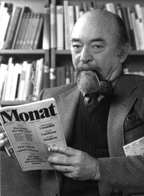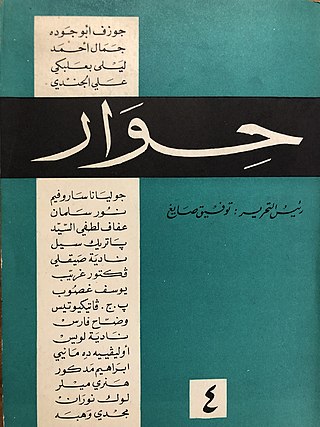Related Research Articles

The Italian Communist Party was a communist and democratic socialist political party in Italy. It was founded in Livorno as the Communist Party of Italy on 21 January 1921, when it seceded from the Italian Socialist Party (PSI), under the leadership of Amadeo Bordiga, Antonio Gramsci, and Nicola Bombacci. Outlawed during the Italian fascist regime, the party continued to operate underground and played a major role in the Italian resistance movement. The party's peaceful and national road to socialism, or the "Italian Road to Socialism", the realisation of the communist project through democracy, repudiating the use of violence and applying the Constitution of Italy in all its parts, a strategy inaugurated under Palmiro Togliatti but that some date back to Gramsci, would become the leitmotif of the party's history.
The Congress for Cultural Freedom (CCF) was an anti-communist cultural organization founded on June 26, 1950 in West Berlin, and was supported by the Central Intelligence Agency (CIA). At its height, the CCF was active in thirty-five countries. In 1966 it was revealed that the CIA was instrumental in the establishment and funding of the group. The congress aimed to enlist intellectuals and opinion makers in a war of ideas against communism.

Nicola Chiaromonte was an Italian activist and writer. In 1934 he fled Italy for France, after opposing Benito Mussolini's fascist government. In Paris he contributed to Giustizia e Libertà. During the Spanish Civil War, he flew in André Malraux's squadron, fighting against fascist supported General Francisco Franco. The character of Scali in Malraux's novel Man's Hope is based on Chiaromonte. After moving to New York in 1941, he took on an important role in the leftist anti-Stalinist intellectual scene of the period, writing for The Nation, The New Republic, politics and Partisan Review. During the Cold War, he helped found, and served as editor, for the Italian journal Tempo Presente, which was published by the Congress for Cultural Freedom. Mary McCarthy was a close friend during his time in the US. A foreword to the 1985 edition of Chiaromonte's book of essays The Paradox of History (1970) was written by Joseph Frank, a noted Dostoyevsky scholar.
Encounter was a literary magazine founded in 1953 by poet Stephen Spender and journalist Irving Kristol. The magazine ceased publication in 1991. Published in the United Kingdom, it was an Anglo-American intellectual and cultural journal, originally associated with the anti-Stalinist left. The magazine received covert funding from the Central Intelligence Agency who, along with MI6, discussed the founding of an "Anglo-American left-of-centre publication" intended to counter the idea of Cold War neutralism. The magazine was rarely critical of American foreign policy and generally shaped its content to support the geopolitical interests of the United States government.

Melvin Jonah Lasky was an American journalist, intellectual, and member of the anti-Communist left. He founded the German journal Der Monat in 1948 and, from 1958 to 1991, edited Encounter, one of many journals revealed to have been secretly funded by the CIA through the Congress for Cultural Freedom (CCF).
Mundo Nuevo was an influential Spanish-language periodical, being a monthly revista de cultura dedicated to new Latin American literature. Sponsored by the Ford Foundation, the magazine was founded by Emir Rodríguez Monegal in Paris, France, in 1966 and distributed worldwide. Monegal edited it until 1968 and resigned after a five-part installation in the New York Times that revealed the Congress for Cultural Freedom, a source of funding for the magazine, was a front for the CIA. In fact, it was started as a successor of another Spanish language magazine of the Congress, namely Cuadernos. Mundo Nuevo stopped in 1971 after 58 issues.
Irving Brown was an American trade unionist and leader in the American Federation of Labor (AFL) and subsequently the AFL-CIO. Brown played a prominent role in Western Europe and Africa during the Cold War in splintering communist-led labor movements. Along with former Communist Party of the USA member Jay Lovestone, he founded the American Institute for Free Labor Development in 1962.
FORVM was an Austrian monthly cultural and political magazine, published in Vienna from 1954 to 1995, founded by Friedrich Hansen-Loeve, Felix Hubalek, Alexander Lernet-Holenia and Friedrich Torberg with the financial and logistical support of the CIA-funded Congress for Cultural Freedom (CCF). Torberg also edited the magazine from its start in 1954 to 1965. In 1965 Günther Nenning took over as editor and in 1986 Gerhard Oberschlick.

The Crusade for Freedom was an American propaganda campaign operating from 1950–1960. Its public goal was to raise funds for Radio Free Europe; it also served to conceal the CIA's funding of Radio Free Europe and to generate domestic support for American Cold War policies.
Cuadernos para el Diálogo was a monthly cultural magazine published between 1963 and 1978 in Madrid, Spain.
The anti-Stalinist left is a term that refers to various kinds of Marxist political movements that oppose Joseph Stalin, Stalinism, Neo-Stalinism and the system of governance that Stalin implemented as leader of the Soviet Union between 1924 and 1953. This term also refers to the high ranking political figures and governmental programs that opposed Joseph Stalin and his form of communism, such as Leon Trotsky and other traditional Marxists within the Left Opposition. In Western historiography, Stalin is considered one of the worst and most notorious figures in modern history.
Who Paid the Piper? The CIA and the Cultural Cold War is a 1999 book by Frances Stonor Saunders. The book discusses the mid-20th century Central Intelligence Agency efforts to infiltrate and co-opt artistic movements using funds that were mostly channelled through the Congress for Cultural Freedom and the Ford Foundation. The aim of these efforts was to combat the political influence of the Soviet Union and expand American political influence. Saunders concluded that by entangling the state in "free" artistic expression, the CIA undermined America's moral position in comparison to the Soviet Union. In Dissent Jeffrey C. Isaac wrote that the book is a "widely discussed retrospective on post-Second World War liberalism that raises important questions about the relationships between intellectuals and political power."

Tempo was an illustrated weekly news magazine published in Milan, Italy, between 1939 and 1976 with a temporary interruption during World War II.
Rinascita was a political and cultural magazine published in Rome, Italy, between 1944 and March 1991. It was one of the media outlets of Italian Communist Party (PCI).

Hiwar was an Arabic magazine published in Beirut between 1962 and 1967. The magazine was established and financed by the CIA during the cultural Cold War, under the cover of a front organization, the Congress for Cultural Freedom.

Mauro Scoccimarro was an Italian economist and communist politician. He was one of the founders of the Italian Communist Party and served as the minister of finance between 1945 and 1947.
Preuves was a French language monthly political and cultural magazine which existed between 1951 and 1975 and was headquartered in Paris, France. It was the first publication launched by the Congress for Cultural Freedom which later started other magazines, including Cuadernos, Encounter, Survey, Tempo Presente and Der Monat.
Cuadernos was a Spanish-language magazine that was published in Paris, France, in the period 1953–1965. Its full title was Cuadernos del Congreso por la Libertad de la Cultura. It was one of the publications of the Congress for Cultural Freedom.
Tilanne was a monthly leftist magazine published in Helsinki, Finland, in the period between 1961 and 1967. It was one of the magazines funded by the CIA through the Congress for Cultural Freedom (CCF) during the cultural Cold War.
Il Ponte is a political and literary magazine in Milan, Italy, which has been in circulation since April 1945.
References
- ↑ Frances Stonor Saunders (2001). The Cultural Cold War: The CIA and the World of Arts and Letters. New York: The New Press. pp. 61, 130, 133. doi:10.1163/2468-1733_shafr_sim140150101. ISBN 978-1-56584-664-7.
- ↑ Edward Shils; Peter Coleman (2009). "Remembering the Congress of Cultural Freedom". Society. 46 (5): 442. doi:10.1007/s12115-009-9243-4. S2CID 142993096.
- 1 2 3 Andrew N. Rubin (2012). Archives of Authority. Empire, Culture, and the Cold War. Princeton, NJ; Oxford: Princeton University Press. pp. 12, 19. doi:10.1515/9781400842179.fm. ISBN 978-0-691-15415-2.
- ↑ Scott Kamen (2008). "Competing Visions: The CIA, the Congress for Cultural Freedom and the Non-Communist European Left, 1950-1967". CiteSeerX 10.1.1.832.597 .
- 1 2 3 4 Chiara Morbi (2018). Domestic political culture and US-Italian relations in the early Cold War: A new perspective of analysis (PhD thesis). University of Birmingham. pp. 213–215.
- 1 2 Andrea Scionti (Winter 2020). ""I Am Afraid Americans Cannot Understand": The Congress for Cultural Freedom in France and Italy, 1950–1957". Journal of Cold War Studies . 22 (1): 92. doi:10.1162/jcws_a_00927. S2CID 211147094.
- 1 2 3 4 Chiara Morbi; Paola Carlucci (2017). "Beyond the Cold War: Tempo Presente in Italy". In Giles Scott-Smith; Charlotte A. Lerg (eds.). Campaigning Culture and the Global Cold War. London: Palgrave Macmillan. pp. 127, 130. doi:10.1057/978-1-137-59867-7_7. ISBN 978-1-137-59866-0.
- ↑ Irving Kristol (Fall 1989). "The Way We Were". The National Interest (17): 73. JSTOR 42896759.
- 1 2 Felix W. Tweraser (2005). "Paris Calling Vienna: The Congress for Cultural Freedom and Friedrich Torberg's Editorship of "Forum"". Austrian Studies. 13: 166, 170. JSTOR 27944766.
- ↑ Raymond B. Nixon; Carter R. Bryan (June 1996). "The Press System of Yugoslavia: Communism with a Difference". Journalism Quarterly. 43 (2): 295. doi:10.1177/107769906604300211. S2CID 143690513.